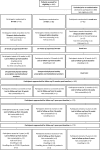Five-year follow-up of the OptiTrain trial on concurrent resistance and high-intensity interval training during chemotherapy for patients with breast cancer
- PMID: 38961182
- PMCID: PMC11222517
- DOI: 10.1038/s41598-024-65436-z
Five-year follow-up of the OptiTrain trial on concurrent resistance and high-intensity interval training during chemotherapy for patients with breast cancer
Abstract
The protocol predefined aim of this study is to assess sustained effects of the OptiTrain trial on several health outcomes, 5 years after the baseline assessment. The OptiTrain study was a prospective, randomised controlled trial with 240 patients with breast cancer undergoing adjuvant chemotherapy that compared the effects of 16 weeks of two exercise programs, RT-HIIT and AT-HIIT, with usual care (UC). After a 5-year follow-up, eligible participants were evaluated for the primary outcome of cancer-related fatigue (CRF) and secondary outcomes including quality of life, symptoms, muscle strength, cardiorespiratory fitness, body mass, physical activity, and sedentary behavior. Statistical analysis was conducted using linear mixed models adjusted for baseline values. Tumour profile and menopausal status were additionally adjusted for CRF. Mean differences (MD), 95% confidence intervals (CIs), and standardized effect sizes (ES) were reported. At the 5-year follow-up, there were no statistically significant differences in total CRF between the intervention groups and the UC group. RT-HIIT reported significantly reduced pain sensitivity at the gluteus MD = 79.00 (95% CI 10.17, 147.83, ES = 0.55) compared to UC. Clinically meaningful differences for an increase in cognitive CRF and cardiorespiratory fitness were observed for the AT-HIIT versus UC group, and for lower limb strength for the RT-HIIT versus UC group, albeit without statistical significance. Engaging in targeted exercise during adjuvant chemotherapy for breast cancer provides short-term benefits in reducing fatigue and maintaining physical function. However, our 5-year follow-up indicates that these effects are limited in the long term. This underscores the need to support breast cancer survivors maintain their PA levels throughout their survivorship journey.
Keywords: Adjuvant chemotherapy; Breast cancer; Cognitive assessment; Exercise; Fatigue; Long-term effects; Physical activity.
© 2024. The Author(s).
Conflict of interest statement
The authors declare no competing interests.
Figures
Similar articles
-
Two-year follow-up of the OptiTrain randomised controlled exercise trial.Breast Cancer Res Treat. 2019 Jun;175(3):637-648. doi: 10.1007/s10549-019-05204-0. Epub 2019 Mar 26. Breast Cancer Res Treat. 2019. PMID: 30915663 Free PMC article. Clinical Trial.
-
Highly favorable physiological responses to concurrent resistance and high-intensity interval training during chemotherapy: the OptiTrain breast cancer trial.Breast Cancer Res Treat. 2018 May;169(1):93-103. doi: 10.1007/s10549-018-4663-8. Epub 2018 Jan 18. Breast Cancer Res Treat. 2018. PMID: 29349712 Free PMC article. Clinical Trial.
-
High-intensity exercise during chemotherapy induces beneficial effects 12 months into breast cancer survivorship.J Cancer Surviv. 2019 Apr;13(2):244-256. doi: 10.1007/s11764-019-00747-z. Epub 2019 Mar 25. J Cancer Surviv. 2019. PMID: 30912010 Free PMC article.
-
High-intensity interval training in the therapy and aftercare of cancer patients: a systematic review with meta-analysis.J Cancer Surviv. 2019 Apr;13(2):205-223. doi: 10.1007/s11764-019-00743-3. Epub 2019 Feb 26. J Cancer Surviv. 2019. PMID: 30806875
-
High-intensity interval training improves cardiorespiratory fitness in cancer patients and survivors: A meta-analysis.Eur J Cancer Care (Engl). 2020 Jul;29(4):e13267. doi: 10.1111/ecc.13267. Epub 2020 May 29. Eur J Cancer Care (Engl). 2020. PMID: 32469144
Cited by
-
Long-term benefits of exercise interventions during chemotherapy in breast cancer: insights from the optitrain trial calling for longitudinal studies.Breast Cancer Res Treat. 2025 Apr;210(2):249-250. doi: 10.1007/s10549-025-07638-1. Epub 2025 Feb 17. Breast Cancer Res Treat. 2025. PMID: 39961970 No abstract available.
-
Longitudinal Profiles and Predictors of Physical Activity in Cancer Survivors Post-Exercise Intervention: A 5-Year Follow-Up of the Phys-Can RCT.Integr Cancer Ther. 2025 Jan-Dec;24:15347354251362447. doi: 10.1177/15347354251362447. Epub 2025 Aug 8. Integr Cancer Ther. 2025. PMID: 40776791 Free PMC article. Clinical Trial.
References
Publication types
MeSH terms
Grants and funding
LinkOut - more resources
Full Text Sources
Medical


